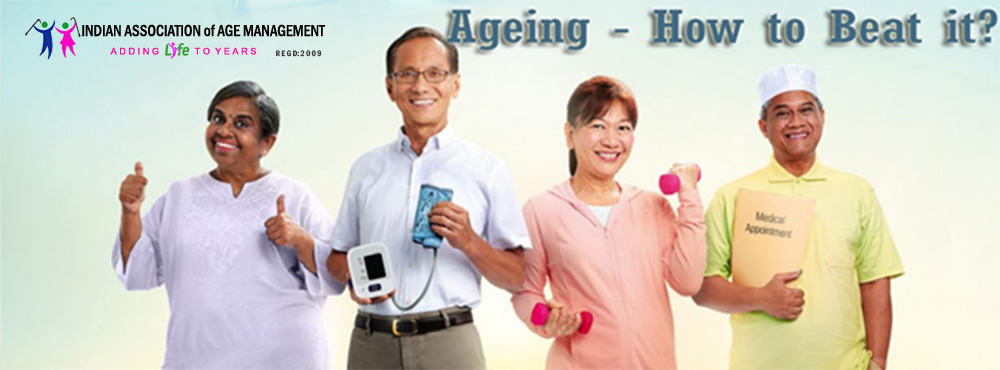
Ageing affects us in various ways like such as wrinkling of skin, greying of hair, decreased vision, heart problems, hearing, decreased pace and mobility. As we age, ageing affects our muscles joints and bones. However, several researches have shown that performing daily physical activity can help to reduce or reverse the risk of disability and chronic disease and delays the ageing process.
So how do our muscles get affected due to ageing?
 As we age, muscles lose its bulk thereby, reducing our physical strength and contributing to fatigue, weakness and decreased exercise tolerance. If we look at it at structural level, then various factors working in combination cause the following:
As we age, muscles lose its bulk thereby, reducing our physical strength and contributing to fatigue, weakness and decreased exercise tolerance. If we look at it at structural level, then various factors working in combination cause the following:
- Reduction of Muscle fibres which decrease not only in number, but they also shrink in size.
- Muscle tissue is replaced more slowly, and lost muscle tissue is replaced with a tough, fibrous tissue.
- At the same time changes happening in the nervous system also cause muscles to have reduced tone and ability to contract.
Does ageing affects our skeletal system?
As we age, there is decline of hormones and the structure of bone changes making them weaker and more prone to fractures (fragility fractures: A fragility fracture is a fracture resulting from a fall from standing height or less. These fractures, which most commonly occur at the hip, spine, or wrist, are an indication that the body’s bones have been weakened).
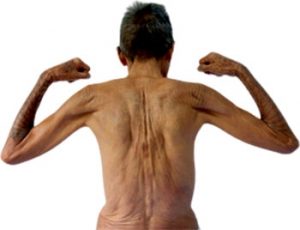 Low bone mass raises your risk of broken bones, including in the vertebrae (bones of the spine), which can cause a stooped posture and loss of height. While low bone mass and osteoporosis are more common in women, they can occur in men, too.
Low bone mass raises your risk of broken bones, including in the vertebrae (bones of the spine), which can cause a stooped posture and loss of height. While low bone mass and osteoporosis are more common in women, they can occur in men, too.
Factors which contribute to the bones losing calcium and other minerals becoming less dense are as follows:
- An inactive lifestyle causes bone softening.
- Hormonal changes –
- Menopause: In women triggers the loss of minerals in bone tissue.
- Andropause: In men, the gradual decline in sex hormones leads to the later development of osteoporosis.
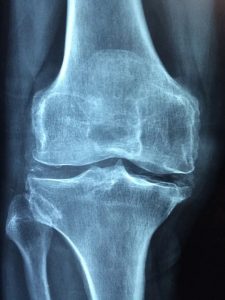 In a healthy joint, bones are separated from each other by articular cartilage which acts as a cushion. Synovial membrane surrounds the joint and secretes a lubricating fluid called the synovial fluid. As we age, joint movement becomes reduced and stiffer and less flexible because of the arthritic changes and decrease in the amount of lubricating synovial fluid inside our joints. Articular cartilage which lines the ends of the bones also decrease in height due to wear and tear and becomes thinner. Ligaments also tend to shorten and lose some flexibility, making joints feel stiff.
In a healthy joint, bones are separated from each other by articular cartilage which acts as a cushion. Synovial membrane surrounds the joint and secretes a lubricating fluid called the synovial fluid. As we age, joint movement becomes reduced and stiffer and less flexible because of the arthritic changes and decrease in the amount of lubricating synovial fluid inside our joints. Articular cartilage which lines the ends of the bones also decrease in height due to wear and tear and becomes thinner. Ligaments also tend to shorten and lose some flexibility, making joints feel stiff.
Does my heart gets affected as I age?
The short answer is YES. As you age, your large blood vessels (arteries) become stiffer (a condition called arteriosclerosis). This causes high blood pressure. Not only this but the walls of the arteries also tend to accumulate a build-up of fatty deposits, called plaques. These plaques harden and narrow the arteries, reducing blood flow to the heart. The build-up of fatty deposits is called atherosclerosis, and a build-up of plaque in the arteries leading to your heart is known as coronary artery disease. It is a major risk factor for heart attack. It is 4 times more common in Indian population as compared to western population and gets easily un-noticed. While not all the heart and blood vessel changes associated with aging can be controlled, following a healthy diet and getting regular physical activity can almost always help to keep your arteries and heart healthier for longer.
Researchers have associated atherosclerosis with impairment in memory, attention and executive function and concluded that the disease might predict a person’s risk of cognitive impairment.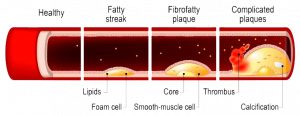
Atherosclerosis is a slow-moving condition that may start in childhood for some people, according to the American Heart Association. While in some cases, the disease progresses quickly when a person reaches their 30s, while others experience no issues until their 50s, 60s or later.
Do my body’s 5 senses get affected as I age?
As you age, you may notice that your five senses — hearing, vision, taste, smell, and touch — aren’t quite as sharp as they once were. You may notice some degree of hearing loss and change in clarity of words which you hear. It may also affect your sense of balance. The sharpness of your vision may dull, and you may need reading glasses. You may start to lose your sense of taste. Your sense of smell may weaken with age due to decreased mucus production and a loss of nerve endings in the nose. You may also find that your sensitivity to touch, pain, pressure, and vibration is reduced — although some people become more sensitive to touch because of thinning skin.
What about my brain function as I age?
It is not uncommon for people to experience some forgetfulness as they get older. Brain’s ability to process new information or to multitasking may slow down. However, when confusion and memory problems go beyond the occasional “senior moment,” that’s not normal, then you should have it checked out by a medical professional specialising in neurological issues. It could be that you are in the early stages of dementia, but you could also have a condition that’s affecting your brain and is treatable.
Should I worry about my dental health as I age?
As per the American Dental Association (ADA), the nerves in your teeth can become smaller with age, leaving you less sensitive to pain and potentially delaying a diagnosis of cavities or cracks in the tooth’s outer surface. And according to an article published in June 2017 in the American Journal of Public Health, more than half of people over age 65 have moderate or severe gum disease. The tough enamel that protects your teeth from decay can start to wear away over the years, leaving your teeth susceptible to cavities.
What are the effects of ageing on my skin?
As we age the skin loses its normal elasticity. As a result of this the skin starts to sag and wrinkle. However, the more you protected your skin from sun damage and smoking when you were younger, the better your skin will look as you get older. The American Academy of Dermatology recommends sunscreen and moisturizer as the two most important anti-aging products you should be using. Wearing a hat to protect direct sunlight on the face in sumeer months helps to protect the skin on your scalp and face. This also lowers the risk of developing skin cancer.
Can my Sexual Life get affected as I age?
After menopause, as the oestrogen levels drop, menstruation stops. Many women experience physical changes, including reduced vaginal lubrication. These changes can also reduce your sex drive.
However, for men, like women they enter Andropause. Ageing is often accompanied by erectile dysfunction — though, as the American Sexual Health Association points out, this is not a normal part of aging and may indicate an underlying medical issue or occur as a side effect of a medication. A decline of hormones often leads to decreased sexual drive and ageing process. Fortunately, many of these physical issues can be readily treated.
So, how can I age gracefully?
Most of the times these age-related changes to muscles, bones and joints, brain, are due to lack of exercise. Physical activity in the recent 5 – 6 decades has decreased due to changing pattern of lifestyle, more demanding jobs, too much of deadlines. People in their spare time are now more in front of TV, Computers, introduction of online games, chat softwares as compared to the golden era where people used to meet, socialise, and had outdoor physical activities and fun.
It’s never too late to start living an active lifestyle and enjoying the benefits. Any exercise at all is better than none.
- Regular exercise and physical activities can help age-related changes to muscles, bones and joints – nervous system. It can even reverse these changes as well.
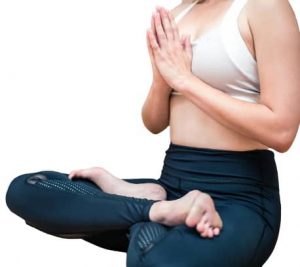 If your job demands sitting, then you should try to have a break after every 30 mins to stretch the body. Keep your posture upright. Have a good quality of chair where you can adjust its height. Exercise helps to increase the bone mass and decreases the bone loss of minerals.
If your job demands sitting, then you should try to have a break after every 30 mins to stretch the body. Keep your posture upright. Have a good quality of chair where you can adjust its height. Exercise helps to increase the bone mass and decreases the bone loss of minerals.
Regular exercise of at least 15-20 mins a day can help to increase muscle mass and strength through muscle-strengthening activities. Physical activity in later life may delay the progression of osteoporosis as it slows down the rate at which bone mineral density is reduced.
Ageing people who exercise in water (water gives buoyancy to the body and it is not weight bearing) may still notice increases in bone and muscle mass compared to relatively sedentary older people.
Weight-bearing exercise, such as walking or weight training, is the best type of exercise for maintenance of bone mass.
Stretching exercises help to maintain joint mobility and flexibility.
If you haven’t exercised for a long time, it is always good that you see a doctor before you start any new physical activity program to ensure that you are not going to do any harm than good.
If you suffer from osteoporosis, you may also be advised to take more calcium. Sometimes, medications are needed to treat osteoporosis.
- Yoga and meditation is an excellent way of having a whole body workout. It is great to improve oxygenation to your body, gives suppleness to the bones and flexibility to the joints. It also helps to improve your brain function.
- Mental Health – Stay Socially Active with Friends and Family – If you don’t currently have an active social life, look for opportunities to reconnect with old friends or make new ones.
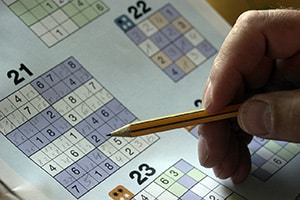 Sudoku or crossword games keep practicing your logical thinking process when you are solving a puzzle. It improves brain activity and is a good nutrition for the brain. Keeps brain sharp and active as per new research.
Sudoku or crossword games keep practicing your logical thinking process when you are solving a puzzle. It improves brain activity and is a good nutrition for the brain. Keeps brain sharp and active as per new research. - Diet – whole foods that are high in fibre and low in saturated fat are good for your body. Oils which are high in Mono-unsaturated fats and low in poly-unsaturated fats are good. (for example, Olive oil). They lower your risk of chronic conditions such as heart disease. No exercise, sedentary lifestyle and food high in oil and fat and high sugar intake causes your stomach to come out.
- Measure your Waist and Hip girth ratio –
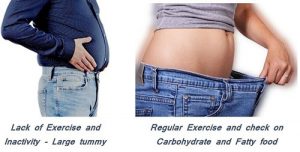 This ratio should be 0.85 or less. You can determine this by measuring the circumference of your waist at the navel. Then, measure your hips at their widest point, usually at the bony prominence. Finally, divide your waist size by your hip size: Waist (in inches) / Hips (in inches) = ratio. How is the ratio translate into health risk? The chance of suffering a heart attack or stroke increases steadily as a man’s ratio rises above 0.95; for women, risk begins to rise above 0.85.
This ratio should be 0.85 or less. You can determine this by measuring the circumference of your waist at the navel. Then, measure your hips at their widest point, usually at the bony prominence. Finally, divide your waist size by your hip size: Waist (in inches) / Hips (in inches) = ratio. How is the ratio translate into health risk? The chance of suffering a heart attack or stroke increases steadily as a man’s ratio rises above 0.95; for women, risk begins to rise above 0.85. - Stop Smoking to Lower Your Risk of Cancer and Heart Disease and limit Alcohol intake.
- Dental hygiene – brush your teeth twice a day. Use soft-bristled toothbrush (change every 3 months), flossing daily (to avoid plaque formation and keeping gums healthy to support your teeth), and regularly cleaning any dentures if you wear.
- Sleep – Adults over 65 get between 7 to 8 hours of sleep each night. However, as you age, you may notice that your sleeping pattern has changed. You are sleepier in the early evening and ready to wake earlier in the morning. This does not pose an issue so long as you continue to meet the recommended seven to eight hours of sleep per night.
Look after Yourself: Schedule Check-ups and Stick to Them
- Regular 6 months to Yearly Check-ups – Regular check-ups with your family physician, dentist, eye doctor, and specialist healthcare providers is highly recommended. It is always better to catch the problems early and treat them before they become bigger problems.
- 6 monthly check-ups: Dental check-up, Hygienist check-up to avoid receding gums and dental problems.
- 1 yearly check-up: Visit your doctor and have your cardiac health, diabetes check-up. This should also include checking kidney function, blood pressure check-up. These tests should also include Lipid profile to assess the High- and Low-density lipoproteins, serum cholesterol and triglycerides.
- 2 yearly check-ups: Eyesight check-up
- 3 yearly check-ups: in women, advisable to have Cervical smear test, Breast mammography. In men advisable to have Testosterone and other male hormones tested to delay the ageing process.
- 5 yearly check-ups: Hearing check-up
- Men above 45 – 50 years: Should have a baseline PSA (Prostate Specific Antigen) test. If the PSA level is between 1 and 3 ng / mL, then men should seek advice from doctor for another PSA test every two to four years.
- Declining Sexual function – any changes in your libido or sexual function that are having a negative impact on your sex life then you should consult us. We specialise in this area and will discuss and explore the cause of problems. You may need assessment of your hormone levels.
- Women above 45 years: for women above 45 years of age important to have check-up to rule out early stages of cancer. Advisable to have Cervical smear test, Breast mammography
- Can I have any prediction if I am more likely to get diabetes or Cardiac problem if I get older? How can I prevent it?
If anyone in your family has suffered from heart problems or is diabetic, then you have slightly higher increased of developing the same problem. An important way to assess this is to get your lipid profile and measure your weight and height and asses the risk of developing heart disease, stroke or diabetes over the course of next 10 years. This can be assessed at https://qintervention.org/ . Your doctor can start you on suitable medication as necessary. The risk is more if your smoker, take steroids, or have high blood pressure.
- Bone Mineral Density – Is it useful? –
Osteoporosis is a common problem, especially for older women. Bones break more easily. Compression fractures of the vertebrae can cause pain and reduce mobility. You should consult a specialist and he/she can organise Bone Mineral Density (BMD) test for you if you fit one of the following criteria’s
- You’re a postmenopausal woman 50 or older
- You’re a woman 65 or older
- You’re a woman at the age of menopause and have a high chance for breaking bones
- You’re a man 50 or older with other risk factors
- You break a bone after 50
- You’ve lost more than 1.5 inches of your adult height
- Your posture has gotten more hunched
- You’re having back pain without any cause
- You’ve had a drop in hormone levels
WARNING SIGNS
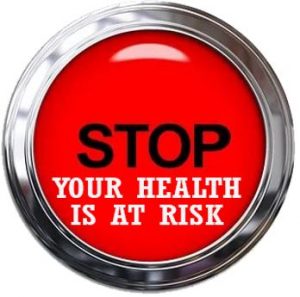 There are some warning signs which you should not ignore and should early medical consultation. Any of the conditions below may mean some significant health problem.
There are some warning signs which you should not ignore and should early medical consultation. Any of the conditions below may mean some significant health problem.
• Abrupt weakness or dizziness
• Shortness of breath or feeling of pressure in your chest area. This can be associated with or without excessive sweating
• Tingling or numbness, wounds that never seem to heal
• Loss of balance or coordination, difficulty speaking or swallowing
• Sudden vision loss or blurred vision
• Any lump felt in the body or in the breast should not be ignored
• Rapid weight loss
• Prolonged confusion
Location
Indian Association of Age Management
c/o Naraina Medical Centre
NH-1, Community Centre, C-Block
Naraina Vihar, New Delhi 110028
17 Comments
It is very good. I will try to follow your recommendations.
Very useful information.
Awesome, informative article! I read it and read it again to learn that we can age gracefully even though aging affects us from head to toes. This article covered a to z aging problems, how to look for and solve them too in a single and easy to read for a lay-woman like me.
I learned that aging is natural but with our daily activity, nutrition and active healthy life style, we can age gracefully.
Thank you Dr. Bansal and Dr. Goyal for giving us timely heads up on a topic that touches us ALL.
Ms Raj Bansal
Thanks for reading the blog in details and with full attention. We have tried to cover the effect of ageing on different organs of the body and at the same time we appreciate that you have put it in more authentic way by mentioning that age affects from head to toe.
You can’t turn back the clock. But You can wind it up again.”
Bonnie Prudden
As per the above narration we believe that by adopting certain measures we can certainly beat ageing and achieve good health free from some of the diseases which are of great concern in old age.
Please view our website as and when you get time because for the public in general we shall continue to add blogs.
This article deals with realty of life and reminding us the ultimate truth of life whether you are a millionaire or slum dweller. The age factor does not leave any body. But knowing how to overcome this dilemma with spirit and knowledge, is taught by this article. Hats off to both the gentle personalities. Pl keep us enlightening.
Thanks for your kind words and encouragement.
Dear Mr Bagga
We fully agree that to be aged is the reality of life. Since all over the world the aged population is increasing, the concern of the social and health organizations is drawing more attention to guide such individuals to remain in good health even at that age. Keeping in view this goal WHO has declared 2021-2030 as the decade for ‘Healthy Ageing’
Thanks for sharing this information. It will help to learn how to manage good life style.
And stay healthy.
Thanks
Thanks for the feedback
Ms Sushma Sirivastava Ji
Thanks for viewing the website and the blog. We have tried to mention some of changes in some of the organs of the body. I hope our suggestions would help the readers to attain good health even though they are aged
This is very precise and useful information
Should be useful as we transform into an aging society
Thanks for your input and comments
Thanks for your comments.
Indian Association of Age Management is established to help the aged population to retain good health so that they remain active till the end of their life and they may not be dependent on anybody. We need the support of doctors, the health workers and even the different social organizations to achieve this aim.
Dear Dr R R Kishore
Greatful to your encouraging comments. We would surely act upon your valuable advice, rather we would continue to take your help.
This is a must read for all individuals to understand and acknowledge the effects of aging and how to be healthy .
Thanks for your comments
This is a very informative and enlightening article. All aspects of aging have been dealt with, in a simple and layman terminology. It will be truly beneficial to the aging population, provided one reads it carefully.
I think a video conferencing may further enhance its impact. My good wishes and support is always with you.
With regards
.
Thanks for your valuable feedback. Will look into the video conferencing option as well.
Comments are closed.